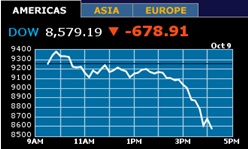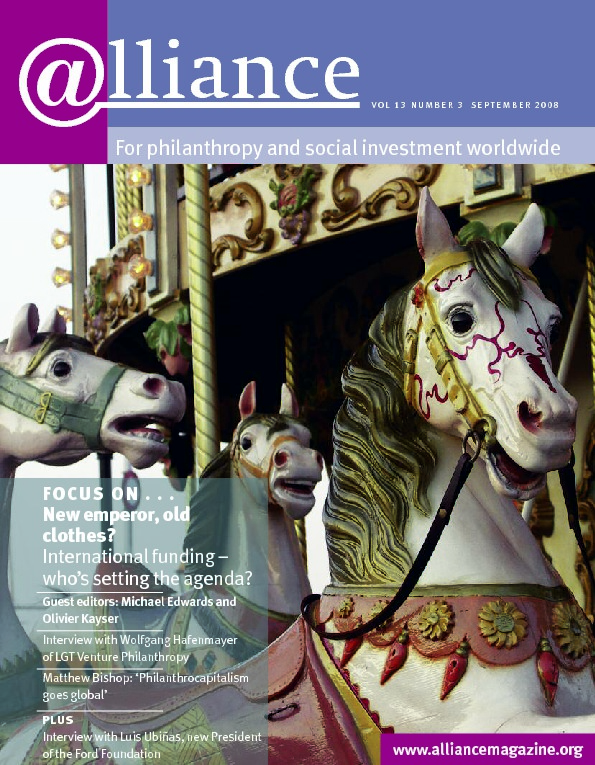 The effects of the financial crisis on giving are only just beginning to be felt. Over the next few issues, Alliance will offer a series of snapshots from contributors in different regions, showing what impact the crisis is having on philanthropy and civil society there.
The effects of the financial crisis on giving are only just beginning to be felt. Over the next few issues, Alliance will offer a series of snapshots from contributors in different regions, showing what impact the crisis is having on philanthropy and civil society there.
In the first of these, observers in Brazil and Russia detect early signs of reduced corporate giving. In India, though it’s business as usual so far for CSR, it’s likely that its practice will become more tightly focused. Meanwhile, in Africa, shrinking resources point to the need to concentrate on developing self-sustaining CSOs. In the Arab region, by contrast, massive commitments for reconstruction in Gaza are defying all the trends.
 Brazil Marcos Kisil
Brazil Marcos Kisil
Separating the real social investors from the rest
There is no data available yet on how much the current economic crisis is affecting giving in Brazil and other countries of Latin America, but there is anecodotal evidence of some company giving programmes closing. Companies that used community engagement and community giving as a PR strategy or a marketing tool were the first to scale down or close their programmes.
The decrease in corporate giving is also affecting companies’ attitudes to corporate social responsibility and sustainability. Certified woods, for example, are losing market, with buyers focusing on the best price rather than the origin of the wood, while employee lay-offs are happening without any attention to the commitments set out in companies’ CSR policies.
Giving from endowed foundations continues relatively stable, though with some decline in recent months. Individual gifts have also been relatively stable up to now, though this might change if unemployment rates increase.
The decrease in giving has also become a topic for the media. Some experts are seeing the crisis as an opportunity to separate real social investors from those who took to social investment as a corporate marketing strategy. The real social investors are fostering collaboration and partnership with other donors: witness the formation of Todos pela Educação (All for Education), where more than 50 businesses have come together to provide better basic education for Brazilian children. There is also more attention to strategic planning and management of available resources, reflected in the way that grantmakers work with grantees.
The crisis has also led to a renewed understanding of the importance of endowed funds. A session about endowed funds in the Foundation School Program run by IDIS and CAF in São Paulo last November, for example, attracted much greater participation than such a session would ordinarily have done.
Marcos Kisil is President of the Institute for the Development of Social Investment in Brazil. Email mkisil@idis.org.br
 Russia Maria Chertok
Russia Maria Chertok
Time to cultivate a new constituency
The economic crisis hit Russia later than US and Europe – some time in mid-autumn – so it is too early to assess the impact it is having. But some anecdotal evidence is already available.
Corporate funding, which has traditionally made up to 70 per cent of the voluntary sector’s budget, is shrinking rapidly. Even the most devoted corporate donors are cutting their budgets or even closing their philanthropic programmes altogether. Some are switching from financial support to in-kind contributions or pro bono work. This is particularly true for large companies which have considerable debt and/or depend on world prices of raw materials, or those from the financial sector or retailers.
Foundations have not yet reported that they are cutting budgets, but neither have they made planned increases. As almost no foundations have endowments, they suffer more from problems in their founders’ business than from market volatility. Those few endowments that were set up during 2008 after the Law on Endowments came into force either invested in cash and are relatively safe (but suffer from depreciation of the ruble) or stay empty as donors’ pledges have not materialized.
At community level, the picture seems a bit less gloomy: local donors have not felt the effects of the crisis so much, and they have a greater feeling of belonging and commitment to the community than the multinational giants.
Finally, neither CAF Russia, which runs a payroll giving scheme in a dozen companies, nor charities that run fundraising campaigns for various causes are reporting any significant decrease in private donations. It seems at the moment that if the voluntary sector wants to survive the crisis, it should seriously consider working with a broad constituency of individual donors. This will require new skills, new approaches and a new mentality. This process may be facilitated by promised amendments to legislation, which will provide tax breaks for individual donors. In the meantime, hopefully institutional donors will be able to support the sector on its way to a new and more sustainable funding structure.
Maria Chertok is Director of CAF Russia. Email mchertok@cafrussia.ru
 India Priya Viswanath
India Priya Viswanath
Engaging in difficult times
Difficult economic times and predictions notwithstanding, Indian companies are not going to stop practising CSR and engaging with community initiatives, but they are undoubtedly going to be more preoccupied with their own businesses. Although employees are withdrawing from programmes as their jobs are under threat, CAF India’s clients are finding ways to stimulate employee engagement. RBS launched Give As You Earn in January 2009 and in the next couple of weeks Barclays (Global Retail & Commercial Banking, India) and Pepsi will launch the scheme for their employees in a nationwide roll-out with CAF India. Cadburys is funding an innovative programme in Himachal Pradesh through the company account started in January, while UBS India’s Community Leadership Experience 2009 this February is focusing on capacity building for non-profit leaders.
Non-profits in India are permitted to invest only in safe investments such as government securities and bonds, so they have not been exposed to fluctuations in the wider market. They are of course affected by falling interest rates. It is too early to say what is happening with money coming in from outside the country.
Priya Viswanath is Chief Executive of CAF India. Email priya.viswanath@cafindia.org
 Africa Akwasi Aidoo
Africa Akwasi Aidoo
A more self-reliant civil society needed
In an interview with Der Spiegel almost four years ago (4 April 2005), the Kenyan economist James Shikwati said provocatively: ‘For God’s sake, please stop the aid to Africa.’ He was referring to the disastrous effects of ill-conceived development assistance and the corruption that often goes with some forms of aid. Given the severe financial crisis that has gripped the industrialized countries, Mr Shikwati’s wish might well be realized much earlier than expected as philanthropic institutions and aid agencies across the board see their assets plummet in value.
The full impact on Africa will become visible only with time, but the effects of lower world prices for Africa’s exports and decreasing remittances from the African Diaspora are already being felt in most countries. The most far-reaching impact of the financial crisis, however, is likely to be a delayed one affecting African civil society organizations that are dependent on resources from industrialized countries.
The impact is likely to be felt in several ways. First, as anecdotal evidence already suggests, many northern foundations whose assets have dropped substantially in value will hold back from funding new work, while support for existing grantees is significantly reduced. Second, northern foundations may, for cost reasons, increasingly decide to carry out their grantmaking through intermediary organizations rather than having a physical presence in the field. While this is not itself a bad thing, it could have the ripple effect of reducing opportunities for direct and long-term learning from the field, which is vital for philanthropic institutions. Third, areas of Africa that have historically received little aid but are in great need, such as Central Africa, will probably continue to suffer neglect, as donors dig deeper into their comfort zones and avoid new terrain. Finally, as the big international NGOs begin to experience reduced funding, their African branches could begin to fundraise in the field, thereby setting themselves up in competition with their local partners for an already diminished donor base.
These effects are still a matter of surmise and would be experienced differently in different parts of Africa, but one thing is certain: they would significantly change the civil society landscape. However, the long-term scenario could present some opportunities. For example, CSOs could become more creative in building local support, and those that survive the hard times ahead could become more resilient. And it could become easier to make the case to donors to dedicate more resources to helping African CSOs become more self-reliant. In the words of Simon Collings of Resource Alliance, ‘if the rhetoric of civil society is to really mean anything, funders need to start investing in helping non-profits become financially independent and sustainable.’ Nowhere is this call more urgent than in Africa now.
Akwasi Aidoo is Chief Executive of TrustAfrica. Email aidoo@trustafrica.org






Comments (0)